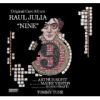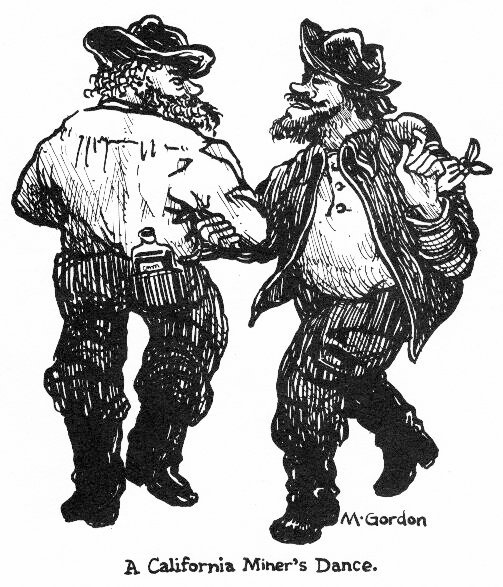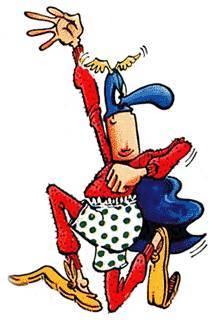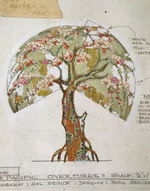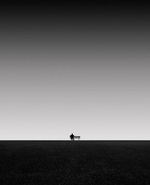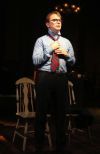Assassins
#1Assassins
Posted: 4/21/14 at 7:47pm
Finally caught "Assassins" at a production at UNC. Interesting concept. Certainly not one of my favorite Sondheim works, but, also not my least favorite. What did you think of it? Did you see either the original Off Broadway or Roundabout rework?
Updated On: 4/21/14 at 07:47 PM
#2Assassins
Posted: 4/21/14 at 8:05pm
I've seen many productions in Los Angeles. My students at UCLA did at least three (we used to study the show).
But I first saw the LA sit-down production which was quite a hit by LA standards. It was excellent.
I love the show. I don't think it quite achieves what its creators intend, but that's not a problem to me.
#2Assassins
Posted: 4/22/14 at 12:36pm
I saw the Roundabout production as well as Oxford's production at the 1999 Edinburgh festival and a couple of small local productions. I like the concept and love the score, but the book and structure somehow cause it to drag for me (like the inconsistent use of the Balladeer, for example). I thought adding Something Just Broke was a huge mistake in the Roundabout production that halted any momentum the show had and worked against the concept of the entire piece. What made the show interesting in the first place was confining the subject to the minds and motivations of the assassins (or wanna-be assassins) not the reaction of the general public to their efforts. The singular idea in the song is pretty much expressed by the characters in the final scene, but from a much more intriguing perspective.
#3Assassins
Posted: 4/22/14 at 4:48pm
Sondheim wrote "Something Just Broke" in time for the original LA production. I had mixed feelings about it. On the one hand, it captures beautifully the feelings of many people after the Kennedy assassination; but as you point out, it rather sticks out at a point where the show is driving toward a close.
And since the overall dramatic action and conflict of the show are already pretty abstract, that's a difficult place to take a break.
But I've never been sure whether the song itself is the problem or it's just a case of my knowing the album so well that "new music" seems an interruption.
P.S. The use of the Balladeer isn't inconsistent, it's just a bit obscure. The Balladeer consistently represents American optimism and he is ultimately driven from the stage ("Another National Anthem") by the dark side of the American dream: the disaffected and disappointed. ("Where's my prize?")
I haven't seen a version where the Balladeer also plays Oswald, but that makes perfect sense to me in light of the above.
***
The above is what makes ASSASSINS a fascinating work, IMO, because it argues that assassinations and the like are the yang to the yin of the American dream.
Updated On: 4/22/14 at 04:48 PM
#5Assassins
Posted: 4/22/14 at 6:17pm
It should be pointed out that early (at least at the Donmar) "Something Just Broke" was situated earlier in the show. I've heard some argue that at least this helped to cause it not to diffuse the tension of the ending (the way I feel it now does) and also it helped people not to assume that it was all about reaction to the JFK assassination. This is a problem I have with where it is now--even with the different lyrics and different era of clothing for the singers singing it, I was guilty for a long time of thinking it was specifically about the JFK assassination--and I see that come up in posts and reviews all the time, so I don't think I'm alone.
But I still don't like its inclusion anywhere (the music also, oddly, sounds like Passion to me, which maybe due to Sondheim writing it then the way the London Follies number Country House, sounds like Into the Woods to me.)
It also probably should be pointed out that there were changes made to the script for the Roundabout--they beefed up the Proprietor's role for example, something I've not sure why they did, though there was gossip that Kudish wanted a bigger role, but all these changes are in the current version you can license. (I don't think double casting the Baladeer with Lee Harvey Oswald is required though, and I hope it's not. They already tried that but decided it didn't work when workshopping the original production--it's a gimmick that seems "cool" in the moment but, IMHO anyway, the more one things about it, the less sense it makes.)
Gothampc
Broadway Legend Joined: 5/20/03
#6Assassins
Posted: 4/22/14 at 6:45pm
I am firmly in the camp that the Balladeer and Lee Harvey Oswald should be played by separate actors.
I think it's an interesting piece. I think that it is its own worst enemy. A bunch of freaks try to kill the President while pretending they're not freaks. I think it would have had more punch if the characters were less cartoonish.
#7Assassins
Posted: 4/22/14 at 7:03pmI don't fully agree with you about them being too cartoony, but I think I get where you're coming from. Certainly I think that's why interrupting the potentially quite chilling final fifteen minutes or whatever, with the sympathetic "people of the country" who the audience of course will relate to throws all of that even more off-kilter.
Queen of the Night
Featured Actor Joined: 6/12/07
#8Assassins
Posted: 4/22/14 at 7:19pmThe local Red Herring Theater troupe here in Columbus Ohio did a really good production of it a few months ago and they doubled the Balladeer with Oswald and it worked very well. The transformation was done onstage with the other actors blocking him from view and a few little changes to his costume and he had switched characters. The blending of the characters as the Balladeer being an alter ego to Oswald made sense in their staging. I thought it was a great production of an underrated and thought-provoking show.
#9Assassins
Posted: 4/22/14 at 7:22pm
Sounds like a great production!
I dunno, maybe I need to see it done well, but I just find it muddles what already (especially with Something Just Broke and some of the new dialogue) is a kinda muddled message, if there is one. On a basic level I guess the point is that any person could turn into an assassin? Or, something?
Gothampc
Broadway Legend Joined: 5/20/03
#10Assassins
Posted: 4/22/14 at 7:48pm
The problem with the Balladeer as Oswald is that it leaves no surprise. It's like the Emcee in Cabaret also being Sally Bowles.
I saw a production where in the very end the audience is led to believe that the Balladeer might be enticed to be the next assassin. Which if the Balladeer is Oswald that doesn't work.
Owen22
Broadway Legend Joined: 2/24/11
#11Assassins
Posted: 4/22/14 at 9:03pmOne of my favorite productions was at Signature in DC. When the curtain rose, you see a set that is an exact replica of the house (with less chairs). Risers raked up from the center in complete mimic of the audience and scenes were played on these risers. Basically, to drive home the theme "the assassins are or could be US". Sounds sorta trite now, but it's a director's show, so I'm sure major theatres feel required to put their director's stamp on it.
#12Assassins
Posted: 4/22/14 at 10:04pm
We've seen 3 productions over the years, including the Roundabout Revival. We keep going back in hopes that the next production will prove us wrong-- that this is just a brilliant collection of songs in desperate need of a coherent play. It has an MC for the 1st number who is promptly overthrown for the Balladeer in Scene 2-- why? It has a series of characters who keep banging into each other with no development or character arc-- they simply ARE, frozen in their assigned archetypes like tabloid celebrities in a wax museum.
It isn't the subject matter we have any difficulty with-- we love dark theater topics, and welcome the idea of grappling with America's obsession with murder and 15 minutes of fame in one package. But to us, only Sondheim came up with anything worth saying-- and spectacularly so. Weidman's work was left in the dust.
#13Assassins
Posted: 4/23/14 at 12:41amPart of that is the revue structure, IMHO--and the fact that, though I think that was the original impetus, the show is sorta half revue. I do like some of the scene work by Weidman (I think the final scene with the assassins and Lee Harvey is strong, for example--though beefing up the MC/Proprieter in the more recent revisions simply confuses things more) and of course it was his idea so he deserves some credit
tom2000a
Chorus Member Joined: 11/10/12
#15Assassins
Posted: 4/23/14 at 8:46pmI saw the Roundabout production and loved it. The score grew on me more after I purchased it but I did enjoy it while at the show. I love where Something Just Broke was placed. The score at first listen was not typical Sondheim and thdn that song hit with the signature Sondheim sound and sent chills down my spine when it first started. It shifted the mood and, for me, the Everybody's Got the Right (Reprise) felt darker than in the opening. Kinda sinister. I thought it was perfect. JMO
#16Assassins
Posted: 4/23/14 at 9:39pm
Thanks, Eric, as always, for the cogent and comprehensive analysis.
***
On a basic level I guess the point is that any person could turn into an assassin? Or, something?
Almost, but not quite. If you look at the Balladeer's first number (with Booth), you get the basic "lone nut" theory of political assassination. It's what we like to tell ourselves, whether it's a presidential assassin, a terrorist, or a mass murder who shoots up a school. "Well, that was just an aberration. He must have been crazy!"
The argument of the play is that such outbursts of violence aren't accidental exceptions, but actually a logical consequence of the disaffection sown by our own myths. We say "every boy (and now girl) can grow up to be president", but that's not really true. We may have a little more social mobility than some countries, but now, as always, only a very few get to part of the nation's elite (in any field).
And that can tend to leave the rest of the people feeling very betrayed. Now most of us don't start shooting strangers, thank God; instead we complain bitterly about corrupt leaders and take shallow reassurance from the fiction put out by Fox News. ("You see? It's not my fault I'm not more successful. The system is rigged by liberals and minorities!")
Where the play stumbles, in my opinion, is at the end when the voice of the American dream, the Balladeer, is overwhelmed by the miscreants and evicted from the stage. I think (and this was confirmed to me by one friend of Mr. Sondheim) that the authors want to say that Americans' sense of entitlement can swamp even the most constructive optimism. That's why we get "Another National Anthem", because in a non-literal sense the old one is out of date.
I don't think that final reversal is at all clear and "Something Just Broke" doesn't help matters.
But it's not a sloppy or "failed play". It's a complex and often brilliant political musical in the best, Brechtian sense of the word (no matter how many times Sondheim gives interviews saying he hates Brecht).
I apologize for the lecture. I've come to love the show very much.
To put it more simply, ASSASSINS explained the Tea Party two decades before the movement began.
#17Assassins
Posted: 4/24/14 at 1:57am
I have always loved Assassins every since I heard the recording years ago. But the more I examine the piece, the more I am question about the setting of the piece. Probably because initially, I didn't question why or how all of these assassins are mingling. Gaveston, what exactly do you mean by "Assassins explained the Tea Party two decades before the movement?"
#19Assassins
Posted: 4/24/14 at 2:14am
I think part of the point of Assassins having all of them mingling is to link their actions and drive home the point that even though attempts on the President's life are rare, that type of action doesn't exist in a bubble. It's directly related to the rest of the society and how it treats people, and their failed attempts at achieving the American dream. All of them believe they are somehow owed something, whether it's a relationship with a woman or their ideas being taken seriously by those in power or political success. When they don't get that thing they feel they are owed, they take an extreme action. Even though most of us don't go out and try to kill someone when we don't reach the level of success we want, there's still a lot of dissatisfaction because we are so constantly told that America is a place where anyone can get what they want and that if we don't achieve that, we are the outliers and there is something wrong with us (as opposed to the system). One of the reasons I think the show makes a lot of people uncomfortable is because, on some level, it's making an attempt to get us to see ourselves in these people who we like to think we have nothing in common with. I don't really care for "Something Just Broke" in context even though it's a good song because it sort of disrupts that. But the lyrics of "Everybody's Got the Right" really exemplify that perversion of the American dream, especially throughout the 20th century.
I also read an essay somewhere that pointed out the fact that by having the assassins speak to one another, we become aware that they were probably aware of each other. Lee Harvey Oswald knew of the notoriety that John Wilkes Booth had achieved by killing the President. These people all wanted some kind of recognition, and they all eventually got that, though probably not in the way they had imagined or hoped.
AwesomeDanny
Broadway Legend Joined: 7/30/09
#20Assassins
Posted: 4/24/14 at 3:27am
I would like to see a production of Assassins in which the role of the Balladeer is doubled with Lee Harvey Oswald, but they are not played as the same character. I think it would be an interesting contrast to see the same man first get scared off by the Assassins, then be enticed by their prospects, but it doesn't really make sense as one character arc.
I like the inclusion of "Something Just Broke" because the piece spends so much time trying to get us to sympathize to some extent with presidential assassins that if it succeeds, we have lost a bit of perspective on what exactly they are doing. We are reminded of what is at stake, which makes the finale all the more chilling. Yes, it is a strong shift in tone, and it should be. I think another argument for the song could be made in that it forces the Assassins to acknowledge the results of their actions, which makes their final reaffirmation (is that the right word?) of their actions all the more chilling.
As for the "message" of the piece, I really don't think it should be interpreted as "this could be any one of us." For much of the piece, we are led along that track as we try to understand why these people took these actions, but the inclusion of "Something Just Broke" should remind us why those characters could never be us. So then we are left with this image of crazy people firing guns, knowing full well the terrible things they are doing to the nation, and having no remorse. This is even scarier than the possibility that they could be us--they are people without empathy who could crack at any moment. And they have guns.
Any production that takes the approach of "they could be any one of you" will fail because most of these characters were not driven to the extremes that would be necessary for most people to kill. It's not "I was about to be raped" or "he had a knife," it's "I wanted to promote the sales of my book" and "I did it to prove my love." The first assassination in the show is motivated by politics, and the reasoning gets more and more preposterous until it's little more than "I just had a feeling." And that's really frightening.
#22Assassins
Posted: 4/24/14 at 6:13amTo be clear, I'm not trying to say that "they could be any one of us" is or should be the takeaway of the piece. However, I do think there is an effort made to get the audience to see the assassins as people...people who were driven to extremes, mind you, but people. The relation to the audience is not through the attempt to assassinate the President, but through the pursuit of the American dream. It means something different to them than it does to us, but there's still a common thread. And identifying with something about someone isn't the same as sympathizing with them, but it does make you sit back and consider who these people were. I think that's terrifying for a lot of people, more terrifying than the idea of randomly insane people doing insane things...it is for me, anyway.
#23Assassins
Posted: 4/24/14 at 11:54am
The use of the Balladeer isn't inconsistent, it's just a bit obscure. The Balladeer consistently represents American optimism and he is ultimately driven from the stage ("Another National Anthem") by the dark side of the American dream: the disaffected and disappointed. ("Where's my prize?")
I say inconsistent because that concept of the Balladeer, as the voice of American optimism or the American dream, doesn't really come across in his lyrics except in the Ballad of Czolgosz. In Ballad of Booth, he's mainly just consistently asking the question on everyone's mind, "Why did you do it?", ultimately condemning Booth in the end. In Ballad of Czogolsz, the Balladeer speaks for the character and his motivations. In Ballad of Guiteau, it's really Guiteau that voices the optimism, which the Balladeer joins in singing, but the song ends with his motivation as a desire to be remembered, which is the theme AFTER Another National Anthem.
That's why I think the character of the Balladeer is more than simply obscure as represented by the text, but inconsistently used. Sometimes the voice of American optimism is voiced by the Balladeer and sometimes by the assassin. Why not Zangara? And by the time you get to Guiteau, the message is so mixed, the role the Balladeer plays in the narration is utterly unclear. Directors have attempted to iron this out in the staging in various ways, but it doesn't alter the odd use of the character in the text. The only time the Balladeer's message is truly clear is in Another National Anthem.
I also think some of the songs should be slightly reordered to make the shift in Another National Anthem and the motivations of the late 20th century assassins more clear. And omit Something Just Broke entirely. The abrupt shift in perspective just doesn't fit in the show and actually dilutes the concept.
Gothampc
Broadway Legend Joined: 5/20/03
#24Assassins
Posted: 4/24/14 at 2:32pm
"To put it more simply, ASSASSINS explained the Tea Party two decades before the movement began."
Oh brother! Words fail me as to how really uninformed that statement is.
Videos


